
Archives

Welcome to the Marlene Meyerson JCC Manhattan Archives
Explore a curated collection of podcasts, videos, and past events that highlight the rich history, engaging discussions, and vibrant community of Marlene Meyerson JCC Manhattan.
Whether you’re looking to revisit meaningful conversations, catch up on inspiring programs, or explore past events, our archives provide a gateway to the moments that have shaped our community. Dive in and discover the stories that continue to inform, entertain, and connect us.





